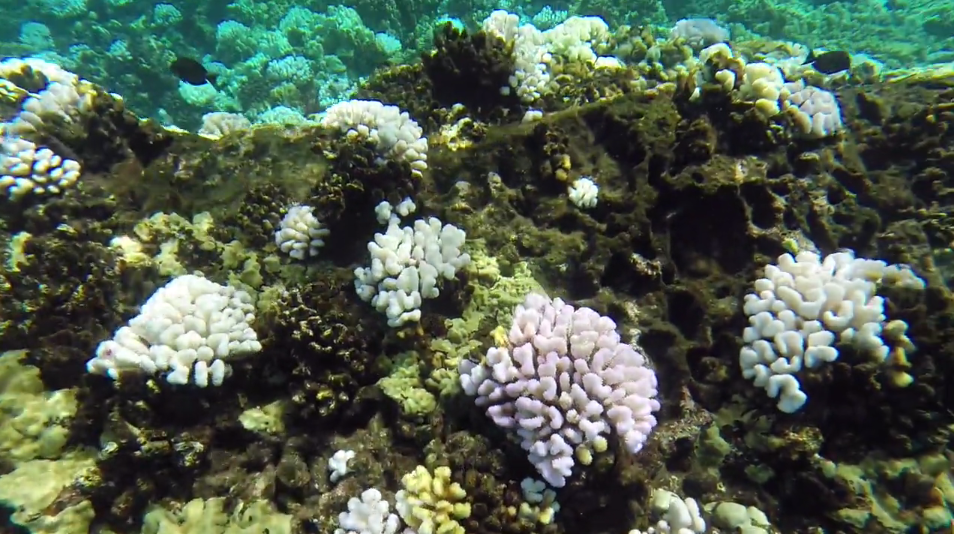10/09/15 – Thousands Of Hawaii Visitors Seeing Coral Bleaching Up Close Researchers Find Unprecedented Bleaching At Molokini
Posted on Oct 9, 2015 in Aquatic Resources, News Releases, slider
DEPARTMENT OF LAND AND NATURAL RESOURCES
News Release
| DAVID Y. IGE GOVERNOR |
SUZANNE D. CASE
CHAIRPERSON |
For Immediate News Release October 9, 2015
(Click on image to watch video)
THOUSANDS OF HAWAII VISITORS SEEING CORAL BLEACHING UP CLOSE
RESEARCHERS FIND UNPRECEDENTED BLEACHING AT MOLOKINI
(MOLOKINI) – When the Keolahou arrives at Molokini Crater, three miles off Maui’s south coast, more than a dozen commercial tour boats are already moored. The Keolahou is a DLNR Division of Aquatic Resources (DAR) research vessel. Yesterday it carried five researchers to Molokini to continue, what has been so far, a three-year-long coral bleaching monitoring project. While the researchers dive to lay out transect lines, to tag coral heads and to photograph them, hundreds of tourists snorkel nearby.
“While the scene underwater is visually beautiful, we hope our visitors realize what they’re seeing is a result of climate change,” said Darla White, the DAR special projects coordinator who led the dive team. “Conservatively at least one half of the corals at Molokini are currently bleached; probably more,” White added.
Bleaching is a response to higher than normal ocean temperatures. While it doesn’t always kill corals, bleaching makes them highly susceptible to disease and other natural and man-caused stresses. This is the second year of severe bleaching across the entire Hawaiian Archipelago. DAR researchers are regularly monitoring 30-40 different coral colonies at Molokini. White continued, “It looks like a winter scene under water, and the extent of bleaching here and elsewhere around the state, hopefully reminds us all, that our coral reefs are intrinsically linked to Hawaii’s economic, our culture and our way of life. We really hope people will get involved and learn what they can do to help. Simple changes in everyday habits to reduce carbon dioxide and other greenhouse gases can make a big difference.”
Suzanne Case, DLNR Chairperson said, “The DLNR, with the support of many volunteers and other organizations, continues to closely and regularly monitor coral bleaching around Hawaii. What boat loads of visitors are now seeing at Molokini, provides an opportunity for us and their tour operators to provide information and education on coral bleaching, what causes it, and what every person can do to try and help reverse what NOAA now describes as a worldwide crisis.”
Hundreds of people participated in last weekend’s Bleachapalooza , where the Eyes of the Reef Network trained them on how to report coral bleaching on their local reefs. That’s resulted in more than 100 new bleaching reports in the last few days. You can learn more about EOR and how to sign up for a training session at www.eorhawaii.org.
# # #
Media Contact:
Dan Dennison
Senior Communications Manager
(808) 587-0407

